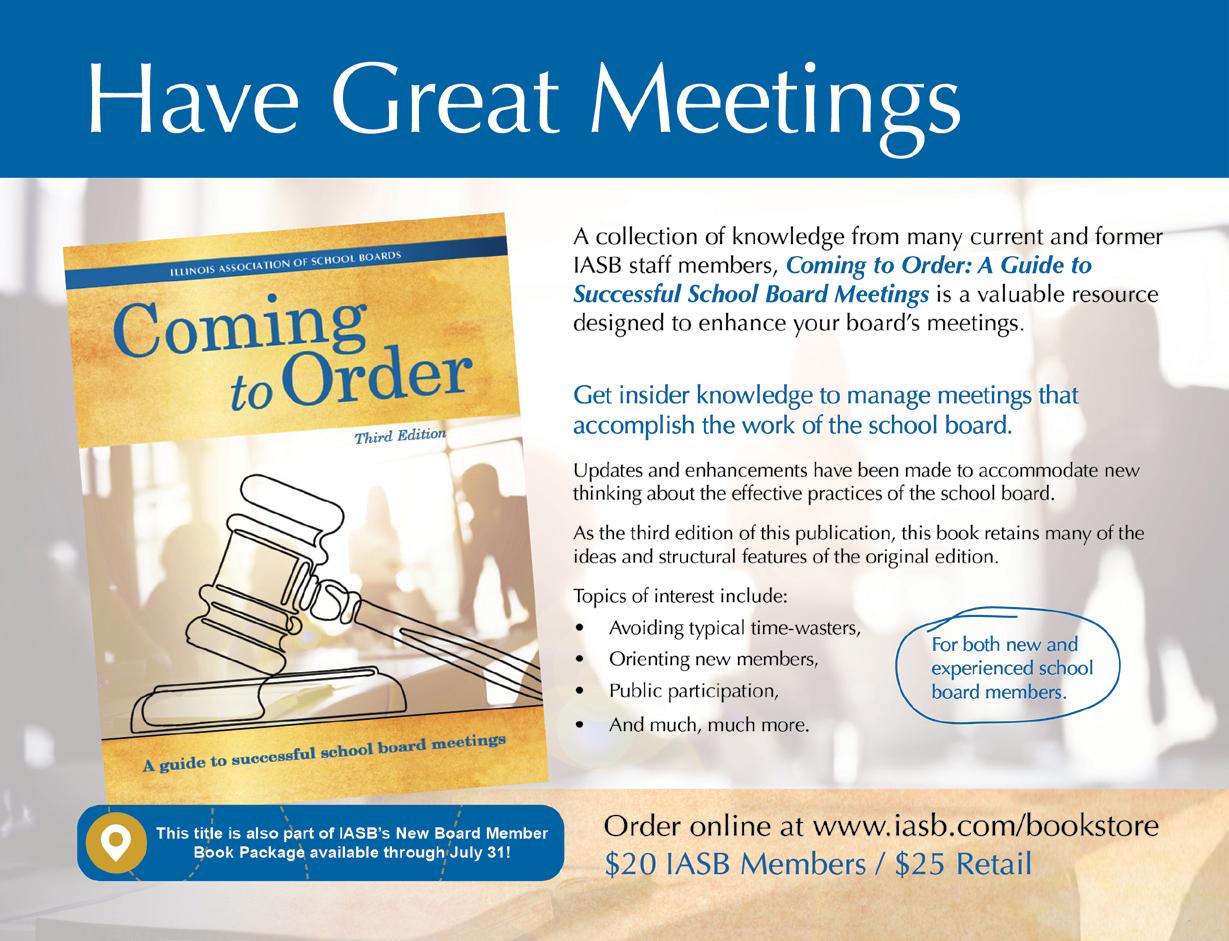Front Page
RRecent events had a few of us in the Communications Department peering into the archives to fill in some historical details for articles, news, and notes from the Illinois Association of School Boards.
Some things never change. Journal articles from the late 1970s include dealing with conflict, understanding changes to the curriculum, the role of the board president, qualifications to teach reading, filling board vacancies, and local control. Moving the research into the mid-1980s, reporting on the IASB member survey from 40 years ago included articles headlined “How are women changing Illinois School Boards?” and “Where the women are.”
At the time all those articles were published, the presidents of IASB were women. A member of the board of education for Peoria Public Schools, the late Elizabeth M. Cleaver was elected the first woman president of IASB in 1979. In the ‘80s, the late Joan Levy was IASB President; at that time, she served on the school board for New Trier THSD 203.
According to “Where the women are,” 25% of Illinois school board members in 1983 were women. In “How are women changing Illinois School Boards?” the author, journalist Lynn Pattison, reported on a
study that concluded that “Women tend to run for the board … out of a deep personal commitment to education and a desire to affect the educational programs in their district, whereas men tend to run … out of a sense of public duty.”
Also, “Women tend to ask more questions and different types of questions than men. Whereas men tend to ask what a proposal is and how much it will cost, women tend to ask why the proposal is being made … or they may also be the first to raise the proposal and ask, ‘What if we tried this?’”
Here’s something that has changed. In the most recent IASB member survey, from 2020, 48% of board member respondents selected female (49% male, 3% preferred not to answer). There are now more women — a lot more — in leadership positions for their local communities.
This issue marks a time of transition for IASB staff and administration as three eminent educators with well over a century of combined experience — Executive Director Tom Bertrand, Associate Executive Director for Board Development Dean Langdon, and Director of Executive Searches Tom Leahy — have retired or departed from the Association for a national role. Each in his own way has made the
Association stronger and served its members with enthusiasm and wisdom.
Filling their roles? Well, this year for IASB, that’s “Where the women are.”
Three illustrious leaders and educators from within IASB are taking on these positions this summer. Kimberly A. Small, the Association’s General Counsel and Associate Executive Director, was announced this past spring as the next Executive Director and is the first woman to hold that position. Lori Grant, formerly an IASB Field Services Director, is the new Associate Executive Director for Board Development. And Patricia Sullivan-Viniard moves from Consultant to Director of Executive Searches.
Each exemplifies, in her own way, a “deep personal commitment to public education.” For certain they will be getting to the whys, raising the proposals, and asking “What if we tried this?”
Theresa Kelly Gegen is Director of Communications/Editorial Services at IASB and Editor of the Illinois School Board Journal. Read more parting words from Tom Bertrand and Dean Langdon starting on page 11 of this Journal. Look for more about and from Small, Grant, and SullivanViniard in upcoming issues.
FEATURE ARTICLES
13 Transformation and Valediction
By Theresa Kelly Gegen and Isaac WarrenA conversation with outgoing Executive Director Thomas E. Bertrand, Ph.D., about a “formative” and “disruptive” five years with the Illinois Association of School Boards.
20 The Role of School Boards and Superintendents in Crisis Management
By John McDonaldA look at crisis management training and lessons learned for those with the ultimate accountability and responsibility.
COMMENTARY
11 Principles for Changing Times
By Dean LangdonIf we want public education to thrive, we must work to protect, adapt, and enhance it.
24 A Bill of Rights to Improve Teacher Evaluations
By Hans AndrewsAddressing teacher job satisfaction is a crucial factor in alleviating the teacher shortage.
REGULAR FEATURES
2 Front Page
4 From the Field Summer, Sun, and SEL
6 Policy Page Legislative Roundup: Key Bills Impact School Board Policies
9 Advocacy Angle The Road to Advocacy
27 Practical PR Partnering with Your Community
34 Milestones
35 Insights
Kara Kienzler, Associate Executive Director
Theresa Kelly Gegen, Editor
Bridget Kusturin, Advertising Manager
Jennifer Nelson, Copy Editor
Isaac Warren, Copy Editor
Katie Grant, Design and Production
Jeff Armbruster, Typesetting
ILLINOIS SCHOOL BOARD JOURNAL (ISSN-0019-221X) is published every other month by the Illinois Association of School Boards, 2921 Baker Drive, Springfield, Illinois 62703-5929 (217) 5289688. The IASB regional office is located at One Imperial Place, 1 East 22nd Street, Lombard, Illinois 60148-6120 (630) 629-3776.
The JOURNAL is supported by the dues of school boards holding active membership in the Illinois Association of School Boards. Copies are mailed to all school board members and the superintendent in each IASB member school district.
Non-member subscription rate: Domestic $20 per year. Foreign (including Canada and Mexico) $25 per year.
Publication Policy
IASB believes that the domestic process functions best through frank and open discussion. Material published in the JOURNAL, therefore, often presents divergent and controversial points of view which do not necessarily represent the views or policies of IASB.
Copyright © 2023 by the Illinois Association of School Boards (IASB), the JOURNAL is published six times a year and is distributed to its members and subscribers. Copyright in this publication, including all articles and editorial information contained in it is exclusively owned by IASB, and IASB reserves all rights to such information. IASB is a tax-exempt corporation organized in accordance with section 501(c)(3) of the Internal Revenue Code.
potentially make this much smaller, have nothing at all, or call it something else like “What’s Inside”
standing heads should be Title Case and left justified. Text black, thin line
Summer, Sun, and SEL
By Natalie Williams-McMahonEEven for adults, there is a meaningful and memorable moment when summer arrives. Summer still means something, no matter what role you play in your educational community. Students, teachers, and parents have left the school buildings. Meanwhile, superintendents and board members are still meeting, making important decisions for the upcoming year. No matter what role you play, there is still work to do in the summer; reviewing and analyzing data, budgets, facility needs, new students, a child’s physical growth, etc. You must prepare for the next school year, but if that’s all you do, there is something missing. Ask yourself, “How am I taking care of me this summer? What are the things I can do to survive, sharing the sun with my parenting and other duties?”
Social-emotional learning (SEL) is the key for all ages. Here are some tips and skills to balance your life as you live to enjoy the summer and the sun.
What is Social-Emotional Learning (SEL)?
Social-emotional learning (SEL) is the practice of developing self-awareness, self-control,
and interpersonal skills that are essential for school, work, and life successes. Everyone needs that balance!
People with strong social-emotional skills are better able to cope with everyday challenges and benefit academically, professionally, and socially. From effective problem-solving to self-discipline, from impulse control to emotional management and more, SEL provides a foundation for positive, long-term effects on children, adults, and communities.
Children can thrive, schools win, and workplaces gain in all aspects. Overall society is able to grow positively, all because of utilizing SEL skills and practices. Social-emotional learning involves the core components of

• Self-Awareness;
• Self-Management;
• Relationship Skills;
• Social Awareness; and
• Responsible Decision-Making
Here is a quick tip for your SEL summer thinking from Wings for Kids, an organization that helps “to equip at-risk kids with the skills they need to succeed in school, stay in school, and thrive in life.”
Build up self-awareness, responsible decision-making, and
relationship skills by following summer activities such as playing, reading, walking in the park, meditating, going to the spa, having a respectful conversation, etc.
• What is a strength of yours that made this activity easy for you?
• What is a weakness of yours that made this activity difficult for you?
For example, if you choose to read a book, think about how the main character or your favorite character felt about a situation, how did they react, were they self-aware, etc.? Then you think about yourself in that position. This activity and way of thinking can help not only children, but adults as they learn to develop and practice self-awareness in a role as parent, teacher, staff, school or district leader, or board member in the community.
Essentially, when thinking of balance and living a thriving and positive life, SEL is a key component that will allow you to have compassion, respect, and a positive attitude toward yourself and others.
Self-management is the ability to manage one’s emotions, identifying and using stress management and self-care strategies, and
demonstrating self-discipline and self-motivation. Here’s another tip from the National Equity Project and Culturally Sustaining Pedagogies by Django Paris and H. Samy Alim:
When focusing on self-management, think about adopting a culturally expansive and sustaining approach to learning how to harness your emotions to further build intervention, self-advocate, and grow to achieve self-determined goals.
For example, take time to learn what triggers your emotions (happy, sad, or angry). Once you identify the emotions and the behaviors behind those emotions, you will be able to manage how you take action, respond, and communicate. Take time to breathe, count down, listen, and think about the best way to respond positively toward yourself and others.
Here’s another tip to improve your SEL skills: Start and/or continue to read and research the different components, strategies, and activities of social-emotional learning. Practice and put into action the skills you learn. Most importantly, share them with others.
We at IASB encourage you to take time to learn, practice, and share what you’ve learned and experienced or your journey, and to enjoy your summer, sun, and SEL.
Natalie Williams-McMahon, Ed.D. is Director of Field and Equity Services for the Illinois Association of School Boards. Resources associated with this commentary can be accessed via iasb.com/journal.
IASB Administration and Sta
As of June 15, 2023
OFFICE OF THE EXECUTIVE DIRECTOR
omas Bertrand, Executive Director
Tulsi Srinivasan, HR Director
Chris Montrey, Admin. Assistant
ADMINISTRATIVE SERVICES
Jennifer Feld, Chief Financial O cer/Associate Executive Director
Karen Faith, Assistant Business Manager
Camille Gillette, Specialist III
Ruth Ann Ferris, Receptionist
Sally Kimmel, Receptionist
OFFICE OF GENERAL COUNSEL
Kimberly Small, General Counsel/Associate Executive Director
Maryam Brotine, Assistant General Counsel
Debra Jacobson, Assistant General Counsel
Ummehani Faizullabhoy, Assistant Director
Michael Ifkovits, Legal Assistant
Karis Li, Legal Assistant
POLICY SERVICES
Angie Powell, Senior Director
Nicholas Baumann, Director
Boyd Fergurson, Director
Tammie Ng, Director
Breanna Rabacchi, Assistant Manager
Emily Tavernor, Assistant Manager
John Fines, Admin. Assistant
Tasha Levy, Admin. Assistant
Jennifer Robinson, Specialist
EXECUTIVE SEARCHES
omas Leahy, Director
Tim Buss, Consultant
Jim Helton, Consultant
Dave Love, Consultant
Alan Molby, Consultant
Patricia Sullivan-Viniard, Consultant
Vic Zimmerman, Consultant
Mary Torgler, Admin. Assistant
INFORMATION TECHNOLOGY
Chris Lawton, Director
Patrick Shea, Assistant Manager
GOVERNMENTAL RELATIONS
W. Bryan Soady, Associate Executive Director
Mary Ellen Buch, Director
Barbara Hobrock, Director
Zach Messersmith, Director
Alie Wagner, Admin. Assistant
MEETINGS MANAGEMENT
Carla S. Bolt, Director
Natalie Duke, Assistant Manager
BOARD DEVELOPMENT
Dean Langdon, Associate Executive Director
Sandra Kwasa, Director
Kathryn Bulava, Assistant Director
Rhonda Cass Mackiney, Assistant Director
Haylie Noltensmeier, Admin. Assistant
Linda Zulaski, Admin. Assistant
FIELD AND EQUITY SERVICES
Nakia Hall, Associate Executive Director
Reatha Owen, Senior Director
Patrick Allen, Director
Arlana Bedard, Director
Lori Grant, Director
Perry Hill IV, Director
Laura Martinez, Director
Natalie Williams-McMahon, Director
Yolanda Chavez, Admin. Assistant
Nancy Johnson, Admin. Assistant
Chelsea Reimann, Admin. Assistant
Cindy Rispens, Admin. Assistant
Shantel Rotherham, Admin. Assistant
Miranda Smith, Admin. Assistant
Gretchen Watson, Admin. Assistant
COMMUNICATIONS
Kara Kienzler, Associate Executive Director
eresa Kelly Gegen, Director
Heath Hendren, Director
Jennifer Nelson, Director
Isaac Warren, Assistant Director
Bridget Kusturin, Admin. Assistant
PRODUCTION SERVICES
Katie Grant, Director
Toby Chiles, Lead Print Shop Operator
Je Armbruster, Print Shop Operator/Graphics
Sta emails: First initial and last name preceding iasb.com
standing heads should be Title Case and left justified. Text black, thin line
Legislative Roundup Key Bills Impact School Board Policies
By Debra JacobsonAAs the dust settles on the spring legislative session of the 103rd General Assembly, IASB anticipates that a number of bills will impact school board policies. Boards that subscribe to IASB’s Policy Reference Education Subscription Service (PRESS) can expect to see many of these changes in the fall legislative PRESS issue. This article contains a non-exhaustive list of significant legislation that is likely to impact most boards’ existing policies.
Discrimination and Bullying Prevention
One of the most extensive bills to come out of this session is SB 90, known as the Racism-Free Schools Act, which will become effective August 1, 2024, assuming it becomes law. The bill was an initiative of TeachPlus, an education advocacy group, and it is intended to highlight and address the issue of racial harassment in schools through:

1. Board policy and implementation of administrative procedures;
2. Mandatory staff training every two years;
3. Enforcement of state antiharassment protections by the
Illinois Department of Human Rights; and
4. ISBE’s annual collection of data from schools regarding allegations of discrimination and harassment (which is subject to appropriation). SB 90 requires boards to adopt at least one written policy that prohibits discrimination and harassment based on race, color, or national origin, as well as retaliation against students or staff who make complaints or participate in investigations of discrimination or harassment. While the bill does not require boards to adopt a separate, standalone policy specific to race, color, and national origin, it does require that this category be distinguished in a broader policy with an appropriate title, heading, or label. Although most boards already have policies generally covering these topics, the bill contains specific policy criteria that will require updates to PRESS sample policies 5:10, Equal Employment Opportunity and Minority Recruitment, 5:20, Workplace Harassment Prohibited, 7:10, Equal Educational Opportunities, and 7:20, Harassment of Students Prohibited
Closely related to the issue of harassment, the legislature also passed a bill to amend the school
bullying statute. HB 3425 was passed in response to a tragic situation involving the suicide of a student who experienced bullying at a nonpublic school. It requires bullying policies to include procedures for school administration to make diligent efforts to contact the parents or guardians of students involved in bullying incidents within 24 hours after they become aware of an incident. The bill also requires that board policies be based on an ISBE model bullying policy, to be posted on ISBE’s website by January 1, 2024. Changes required by this bill and the ISBE model policy will be incorporated into PRESS sample policy 7:180, Prevention of and Response to Bullying, Intimidation, and Harassment.
Finally, SB 1446 was passed to ensure that students are not prohibited from wearing or accessorizing their graduation attire with items associated with the student’s cultural, ethnic, or religious identity or other characteristic protected under the Illinois Human Rights Act. Similar to the Jett Hawkins law passed last year, boards will need to revisit PRESS sample policy 7:160, Student Appearance, and, if applicable, 7:165, School Uniforms, to ensure compliance.
Staff Training and Shortage
In addition to SB 90’s staff training component on racial discrimination and harassment, several other bills addressed staff training topics. Significantly, HB 3690, an initiative of the Illinois Principals Association that was supported by IASB, streamlines many staff training requirements by tying them to the five-year licensure cycle and exempting school support personnel from in-service trainings that are not relevant to their work. However, at the same time, other bills added new training requirements for all school staff on homelessness (HB 3116) and response to trauma (HB 1561), also known as “Stop the Bleed.” If signed, this set of bills will require boards to revisit PRESS sample policy 5:100, Staff Development, to incorporate and modify training requirements. With a few specific exceptions, boards can decide whether to list all staff training requirements in policy. Including them in policy can help the board to monitor the district’s compliance with the required training topics.
The General Assembly also continued to pass bills aimed at easing the ongoing teacher shortage, some of which will lead to board policy changes, including PRESS sample policy 5:220, Substitute Teachers. For example, if a district is unable to fill a teaching vacancy due to a lack of qualified candidates, HB 3442, an initiative of the Illinois Council of School Attorneys that was shepherded by IASB, allows a district to continue to employ a substitute teacher for 90 (rather than 30) calendar days or until the end of a semester by filing written requests with its regional superintendent, provided the substitute is supplied with appropriate training. Another bill that appears intended to attract workers is SB 2390, which allows boards to adopt a policy to waive tuition costs for a non-resident student if the student is the child of a district employee. Boards interested in this option will need to amend policy 7:60, Residence
Curriculum Bills
In keeping with historical trends, public school curriculum was not spared from legislation this session. It is IASB’s understanding that none of the curriculum bills passed require creation of new, standalone courses or add to current graduation requirements. Rather, they incorporate new topics into existing course or subject offerings beginning in the 2024-2025 school year. The highest-profile bill was HB 1633, which requires instruction on Native American history and contributions to
IASB Board of Directors
As of June 15, 2023
PRESIDENT
Simon Kampwerth Jr.
VICE PRESIDENT
Mark Harms
IMMEDIATE PAST PRESIDENT
omas Neeley
TREASURER
Tim Custis
ABE LINCOLN
Christopher Gordon
BLACKHAWK
Je Johnson
CENTRAL ILLINOIS VALLEY
Tim Custis
CORN BELT
Nick Sartoris
DUPAGE
omas Ruggio
EGYPTIAN
Lisa Irvin
ILLINI
Kimberly KenileyAshbrook
KASKASKIA
Linda Eades
KISHWAUKEE
Robert Geddeis
LAKE
Marc Tepper
NORTH COOK
Alva Kreutzer
NORTHWEST
Chris Buikema
SHAWNEE
Sheila Nelson
SOUTH COOK
Joyce Dickerson
SOUTHWESTERN
Mark Christ
STARVED ROCK
Jim McCabe
THREE RIVERS
Liz Campbell
TWO RIVERS
Tracie Sayre
WABASH VALLEY
Mandy Rieman
WEST COOK
Janice Roeder
WESTERN
Sue McCance
SERVICE
ASSOCIATES
Mark Jolicoeur
The vision of the Illinois Association of School Boards is excellence in local school board governance supporting quality public education.
The mission of the Illinois Association of School Boards is to Light the Way for its members by developing their competence and confidence through a robust toolkit designed to build excellence in local school board governance, including
• Premier training experiences;
• Networking opportunities for mutual support;
• Valuable benefits, pooled services, information, and expertise;
• Advocacy on behalf of public education; and
• A platform for a strong collective voice on common interests and concerns.
be included in elementary and high school social studies curricula. Other curriculum bills related to student health issues. HB 3924 and HB 3932, respectively, require instruction on the dangers of fentanyl and allergies to be covered in high school health education. Boards can expect these changes to be addressed in PRESS updates to sample policy 6:60, Curriculum Content.

Student Health Bills
Building on the issue of student health concerns, the General Assembly passed HB 3428, which requires districts to maintain a supply of an opioid antagonist, unless a district is unable to secure a supply due to a shortage. Previously, the maintenance of such a supply had been optional. This bill coincides with the Food and Drug Administration’s recent approval of an overthe-counter version of naloxone, an opioid antagonist. Lawmakers also passed HB 3613, which permits, but does not require, schools with special education facilities to maintain an undesignated supply of oxygen tanks. These changes will warrant a review of policy 7:270, Administering Medicines to Students
Board Governance Bills
Finally, there will be policy updates related to board governance. In a positive development, HB 2447 expands the reasons for remote attendance under the Open Meeting Act (OMA) to include a board member’s inability to attend a meeting in person due to unexpected childcare obligations. Boards that allow for remote attendance with a physical quorum present under policy 2:220, Board Meeting Procedure, will need to update that policy to include this additional reason. A reminder that as of May 11, 2023, the date the Governor ended the statewide disaster declaration for COVID-19, boards are no longer able to meet remotely without a quorum physically present due to a public health emergency. HB 2447 also adds to the exceptions for closed session under OMA. It permits a board to meet in closed session when it hears cases about barring individuals from attending school athletic and extracurricular school events for up to one year under Section 24-24 of the School Code.
Illinois Statewide Fingerprint and Background Check Services
• Over 20 years of experience
• FBI CJIS approved AWS GovCloud secure data storage
• Walk-in locations, convenient hours
• Mobile on-site service for large groups
• Bilingual call center for live customer support
• Convenient payment terms with account set-up
• ABLE Track dashboard for easy applicant tracking
• Illinois privacy requirement compliance
Katy Radcliff Senior Director, Customer Successkradcliff@accuratebiometrics.com
500 Park Boulevard, Ste. 1260, Itasca, IL 60143 773.685.5887
Since 2006
standing heads should be Title Case and left justified. Text black, thin line
The Road to Advocacy
By Barbara HobrockVVolunteering in our communities helps fulfill our civic duty, above and beyond our expected civic duties of paying taxes, obeying laws, jury duty, and voting. There are many ways to volunteer time and talents, such as being a member of a local non-profit organization, being an active member in a church, and of course, serving on your local school board. Volunteering creates an avenue for passions to be developed, relationships to be formed, and voices to be heard. It is within this role that ideas and experiences can turn into advocacy and inspire change for the greater good.
My personal journey to advocacy is only one example of how a passion can grow in unexpected ways.
Being a stay-at-home mom, I looked for volunteer opportunities in my community once my daughters were in school full-time. Naturally, the school seemed to be a great fit. I could volunteer while my girls were in school so there wouldn’t be a need for a sitter, I could strengthen relationships with people at the school to become a better parent supporting my children at home, and we all know schools need help and do not have the budget to hire people. Whether I had 30 minutes or a whole day, I was fortunate to have
the ability to put my time and talents into my local school district and help make things better.
I decided to take my volunteering to the next level and became an office manager for an alternative school, which was an eye-opener. Working with the students that needed the most support every day made me a better parent and a more empathetic person. Hearing their stories, listening to what they really need, and helping to fill that void opened my eyes to the reality of what students deal with every day.
Next, I moved on to be an administrative assistant at an elementary school. There I learned that relationship building is of the utmost importance, not only with not only students but also staff and parents. The more you know, the more you can help. It was there that I met the little girl – I will call her “Missy” -- who changed my life. Missy and I established a morning routine where she came into my office and decompressed from the stresses of the night before, so she could go to class and learn. Without enough school counselors to go around, I helped as much as possible until one was available. We got good at talking about things, getting to know each other, and working on our coping mechanisms. Missy inspired me to run for my local
school board to become a stronger advocate for students like her. I was elected in 2017 and it was then that my thirst for advocacy was born.

While serving on my local school board, I attended the Joint Annual Conference (JAC) as our delegate. After reviewing the proposed position statements with my board for the Delegate Assembly, I knew the direction my board wanted to advocate for and represented accordingly. It was exciting to represent our board and our students in a room with over 450 other school board members to vote on what direction IASB will take in the upcoming legislative session.
During my tenure serving on the school board, I needed to learn more, so I began to work for the State Board of Education. Several of my co-workers there also served on school boards and it was great to learn from their experiences in their communities. I oversaw task forces where school board members served as appointed members, and I watched advocacy in action. The words and actions were inspiring and furthered my passion to advocate for those that cannot advocate for themselves. I watched school board members lead while keeping students as their constant lens through which to view every decision. Their input
mattered and changed the scope of education in many ways. It takes bravery and courage to speak up in a room full of experts and advocate for children. This bravery inspired me further. I needed to do more.
In January, I began the latest stage of my advocacy journey when I became Director of Governmental Relations for the Illinois Association of School Boards. Being able to view legislation through the eyes of a former school board member, while keeping students at the forefront of each decision, is advocacy in action. Being able to speak on their behalf is an honor and learning from those I am lucky enough to work with is a blessing. During the past legislative session, I was able to testify on a bill related to school mapping, due to an experience I had while serving on my local school board. I was also able to speak at a press conference on the same topic. I would not have been able to be an advocate at this level without having served my community as a school board member.
Hopefully, you have seen IASB’s Calls to Action, which alert members to take action on particular bills that have been filed. In the last legislative session, IASB sent several Calls to Action asking our members to file witness slips. Prior to each bill being heard in committee, the witness slips are read by the committee chair, and the overall number of slips matters. Filling out a witness slip is easy and takes only a few minutes from your phone or computer – yet it is powerful advocacy in action.
Advocacy can begin in the most unexpected places. Missy brought out the advocate in me and gave me the courage to speak not only for her,
but also for other students that need our help. As a school board member, there are many ways to further your advocacy. From filing a witness slip, to speaking to your legislators, to testifying in committee, you too can expand your voice and deepen your impact.
From a retired school board member to current school board members, thank you for volunteering your time to serve on your local school board and I ask you, who is your Missy? How can you further your road to advocacy? The IASB Advocacy Ambassador Program is a grassroots program designed to build relationships between school board members and state and federal legislators. Advocacy Ambassadors help IASB meet its advocacy goals by
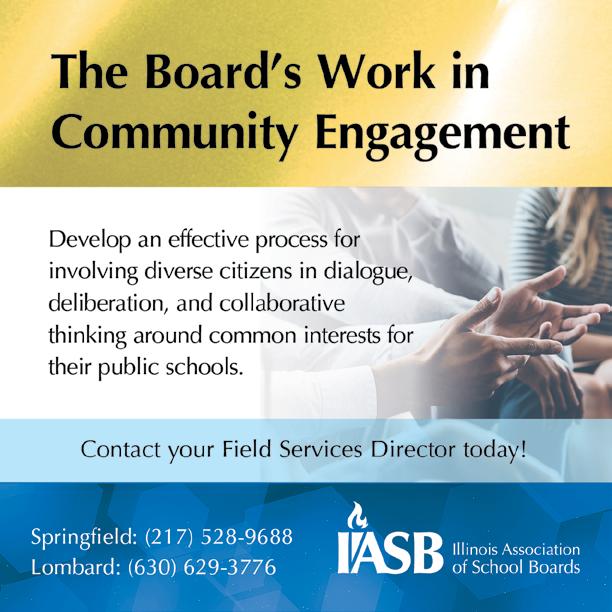
sharing personal stories and expertise on policies related to education. No experience is necessary to become an Advocacy Ambassador – all you need is your voice, your passion, and a commitment to making a difference. Become an Advocacy Ambassador today! Visit the link below for more information or to reach out to me directly so we can work together on your road to advocacy.
Barbara Hobrock is Director of Governmental Relations for the Illinois Association of School Boards. To find out more about the Delegate Assembly and Resolutions Process, and to access resources for becoming an Advocacy Ambassador, visit iasb.com/advocacy. Hobrock can be reached via email at bhobrock@iasb.com.
Principles for Changing Times
By Dean LangdonTThese are interesting times for school board members, and for most of you, the word “interesting” is not nearly descriptive enough.
We have experienced increased polarization, making it more difficult for school boards to work together and make decisions that are in the best interest of all students. Outside interest groups have politicized policy issues and school board elections, resulting in community discussions that may not address educational outcomes. This reduced focus on education issues serves as a distraction for the board, the district, and our collective work toward serving the community. Many times, this can result in the prioritization of a political agenda over the needs of students, limiting the diversity of ideas at the board table. Political ideology and the use of the board platform to speak to special interest groups only serves to limit the kind of community-wide dialogue we need to address our most challenging issues. And more polarization means reasonable, thoughtful citizens are less likely to run for the board in the future. If the trend continues, where does it lead us?
You likely know the IASB Foundational Principles of Governance, related to the board’s role in clarifying purpose, connecting with community, employing the superintendent, delegating authority,
monitoring performance, and taking responsibility for self-governance – in other words, the job description of the board. In these times, I would like to suggest a new principle for the board of education – to protect, adapt, and enhance the institution of public education in your community.
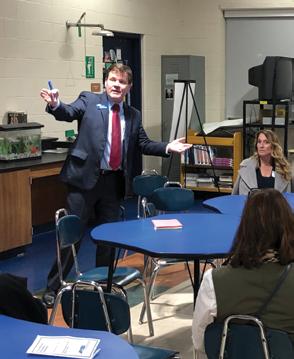
Protecting public education starts with the idea that everything we do, individually and collectively, influences those around us. We are all connected. Adaptation incorporates taking responsibility through changing and challenging times. The board of education and individual board members can have a tremendous impact, positively and negatively, on the work of the administration, the staff, and the students. Enhancing public education will look different for each school district and starts with defining and supporting the mission and vision. Enhancement makes a statement for the institution of public education.
Reflect on the following as you consider your role individually and the work of the board: Does the board add value or serve as a distraction for the district staff, students, and the community?
Years ago, I was asked to facilitate a goal-setting session for a board that had just dealt with numerous contentious issues. I was prepared to
discuss goals surrounding student achievement, programs, finance, etc. About 10 minutes into my work, the board president stopped me and asked the board, “Can we spend our time planning activities that will improve our reputation as a board in the community?” Brilliant. This board president understood that the board had been a distraction from the work of the district and in order to add value, they needed a plan to improve their credibility. We then spent our Saturday discussing how the board could better govern the district and demonstrate that work transparently to the community. Does the board model a deliberative process focused on the most important issues of the district and still adapt as the times change?
The pace of change in society and within our communities can
be dizzying – I get it. Still, we can’t slow it down and we shouldn’t try to stop it. How do we approach this new and ever-changing environment? Follow your agreed-upon board processes and adapt to the content. We all know that effective boards focus on policy. Let policy be your tried-and-true guide for governance processes while you address these new issues with an open mind. Deliberate thoughtfully and inclusively as new issues arise, knowing that many of the old solutions won’t apply to new challenges. Remember: We want an effective public institution for the next generation.
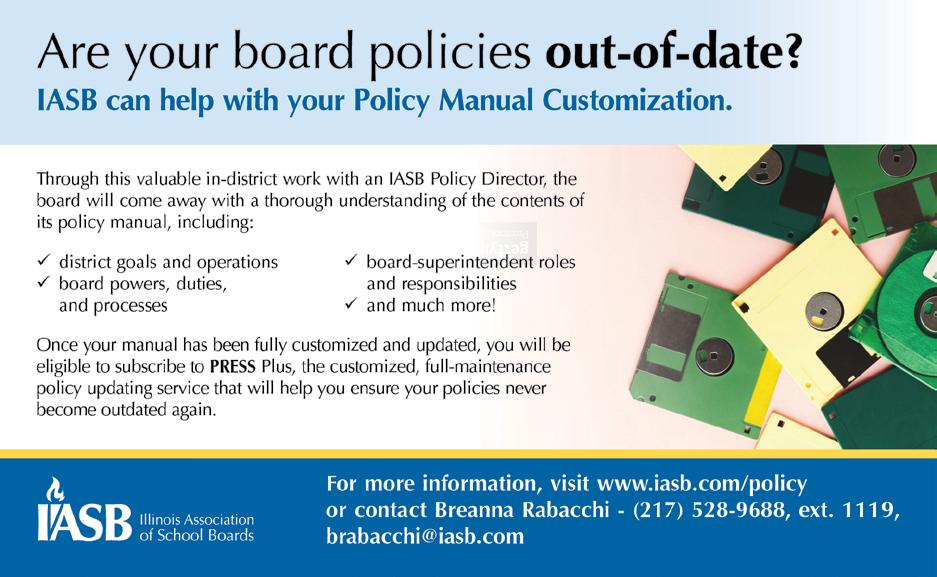
Does the board provide a supportive foundation that allows leaders to lead, teachers to teach, and students to learn?
A few years ago, I asked a young job seeker what they were looking for in their next employer. The answer surprised me, “stability.” This 20-something was looking for someplace to grow, learn, and thrive. This is a lesson for boards of education, too. Would a superintendent want to work for your board? Does the board provide stability with clear expectations, articulate well-defined roles, and have the discipline to stay focused on common, organizational goals? Employees that are proud to work for your board develop relationships in your community, make a commitment to your children, and become the kind of long-term employees you desire. Our schools are easy to take for granted because they are effective
for so many. Each day, the kids get on the bus. They learn in our classrooms, taught by highly qualified professionals. They participate in activities that help them develop and work well with others. And they become model citizens that positively impact our communities. But our public school system, intended to promote the common good, didn’t happen by accident. We designed it for this purpose. If we want it to thrive for the next generation, then we must follow the principles of effective governance and work to protect, adapt, and enhance public education.
Transformation and Valediction
Parting Words with IASB Executive Director Tom Bertrand
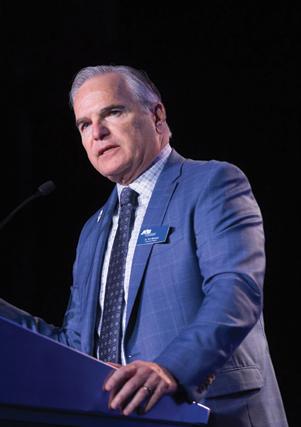 By Theresa Kelly Gegen and Isaac Warren
By Theresa Kelly Gegen and Isaac Warren
TThe Journal sat down with outgoing Executive Director Thomas E. Bertrand, Ph.D., for a conversation about his five years with the Illinois Association of School Boards, a time both “transformational” and “disruptive.” Bertrand, who started at IASB in 2018, is departing the Association this summer and will be the first Executive Director of the Consortium of State School Boards Associations (COSSBA).
No one was expecting what has gone on since 2018, a global pandemic, political unrest, and everything else with enormous stresses to public education. What can you tell us about the Association’s adjustment and adaptation to the past few years?
Tom: Well, certainly it’s felt like a five-year sandwich, with a normal first year and a fairly normal fifth year, and in between kind of a messy sandwich. It’s a convergence of not only the global pandemic, but racial injustice issues, increased political polarization and increased attacks on public education in general, all of which I think led to kind of a collective feeling of frustration, exhaustion, and for many a sense of loss.
In terms of organizations, as I reflected on my time, the two words that come to mind the most
are “transformational” and “disruptive,” with the convergence of challenges. For organizations, to adapt and survive meant that a failure to adapt to the world that we were living in could jeopardize an organization’s very existence. I think it was critically important these past five years for organizations, including IASB, to be more nimble and more flexible, to adapt more quickly, and to be responsive to their members. I think that was critically important. I’m really proud of the fact that the Association, as we have emerged from the pandemic, member retention is at 100% and at the highest level of membership in our history. That’s really a tribute to the staff and to the commitment of the staff to serving the membership during an incredibly difficult time. This five-year period has also forced organizations to not only look at how they served their members in new ways, but also to look inward. At IASB, we’ve certainly done that as well over the last five years. This period that we’ve been living in has magnified the importance of school board service. School boards have been in the spotlight, obviously, with the pandemic and all the other challenges. And I think board service is going
to remain in the spotlight for the foreseeable future.
So it’s certainly been an interesting time, a challenging time. But at the same time, organizations had to adapt and that’s not a bad thing. These times have forced organizations, including ours, to adapt more quickly to be responsive to the membership.
And so now looking back, organizations are asking the questions, “What remains and what’s gone forever?”
One IASB example of that would be our new board member training, which used to be exclusively in-person, now is entirely online and has received tremendous
response from attendees. There are certain practices that will forever be changed; others that will remain. Organizations also have been challenged to take risks to try to improve services to their members. And that’s what we have been doing, and I expect the Association will continue to do in the future.
How do you think that all of that has impacted, going forward, the principles and priorities of IASB?
Tom: The lasting effects of what we’ve been through will remain. These last five years have impacted
but we pass it anyway. Afterward, we’re trying to clean it up through trailer legislation and through feedback from the field. I think that’s a concern as we continue to move forward.
Also, clearly over the last five years, local citizens found their voice. I do think that collectively across our country, there’s a general sense that government at the federal level and the state level may not be working for a lot of our citizens. They don’t feel seen and they don’t feel heard. But at the local level it is their opportunity to feel seen and
need to go to better serve children and their families. We’ve been very successful, I think, as a state in raising the bottom for many of our school districts through the funding formula. We’re not there yet. We’re not on track to fully fund adequacy to all of our schools in a timely manner, or at least in as timely a manner as we would like to see in what was originally intended. But we are on a positive trajectory.
student learning and impacted the mental health of our school communities. It’s impacted the workforce as well. So I think that will continue to influence what we do as an organization.
I think also the turnover that occurred in the General Assembly during this past five-year period, the increased focus on schools and public education in particular coming out of the pandemic, is resulting in more mandates and a further erosion of local control, which we should be concerned about collectively. And a lot of these mandates are well-intended, but unfortunately there’s a readyfire-aim approach that’s often taken with mandates in which we don’t know the impact, we don’t know the cost, we don’t know the practical application of a mandate,
heard. And so I think from a school board perspective, school boards are going to have to continue to be thoughtful about how we meaningfully engage our school communities in a positive way.
At the outset of your time as executive director, the focus was on the then-recently adopted Evidence-Based Funding formula. That was a main topic of conversation in your predecessor, Roger Eddy’s, outgoing conversation. What is your opinion of how that is playing out?
Tom: Ultimately a budget reflects your values. So, we are fortunate that we’re in a state where the budget does reflect valuing public education; providing students with equity, access, and opportunity; and driving more resources where they
I think some challenges going in going forward involve competing interests. There are certainly competing interests for dollars and the state has been committed to new dollars towards funding the Evidence-Based Funding formula, which has been a good thing. But that will be increasingly challenging as federal funding goes away and competing interests surface as groups compete for dollars. And frankly, mandates cost money. In one hand, you’re getting additional state funding, but in the other hand you’re getting more mandates that are very expensive to implement, so it’s eroding the new dollars that you just got. I think that’s something that will put pressure on the formula going forward.
I think there are also some that would like to further tweak it to make improvements, in their opinion, to the formula. I think the concern with that from my perspective right now is we haven’t fully funded it yet. It’s having success in leveling the playing field across our state and driving these resources where they need to go. But before we tinker with the formula, we need to fully fund it, in my opinion, unless there’s something dramatic that needs to be addressed. And certainly inflation is a concern,
Ultimately local school board governance works, but it only works through caring, committed people who are willing to serve on the school board.
that the expenses that districts are incurring locally are eating away at new dollars they receive, just like we are all experiencing at home right now. I think inflation will continue to be a challenge as well as when federal funds, that were sent to schools during the pandemic, go away.
You arrived at IASB with the five Es, Envision Engage, Empower, Evolve, and Educate; then quickly added a sixth, Equity. How have those played out in your time here and how did they guide the association’s work?
Tom: The six Es are our marching orders. They are from the board of directors as to what they value and prioritize for the Association. I’m really proud of the progress that we’ve made, both internally and externally around these six Es and one area in particular: Equity, diversity, inclusion. I am pleased not only with how we’ve served our members in that area, by continuing to look at how we support their work in the field, but also looking inwardly. Our Association staff looks different than it did five years ago. We have much more diversity of experience and of perspectives that we’ve brought to the IASB staff. I’ve said before that in order to serve your members, you have to be the best version of yourself. And so our staff have done a really good job of embracing our own internal work towards equity, diversity, inclusion, and their own professional growth in that area. So that’s something I’m really happy with.
Collectively, and it touches on all six of the Es, we’re more member-focused in our work. We’ve been quicker to adapt in response
to our members. We’ve gotten better at using data to illustrate our progress toward each of those six Es, and I’m excited we’ve started this work in developing our member engagement dashboard that will be primarily for internal use and is ultimately about how well are we reaching our members and serving our members. So I’m excited about that.
We have really high levels of satisfaction among members who attend our activities, participate in IASB events, and receive our materials. I’ve talked about member retention being at 100%, which is great and we have really good membership right now, the highest that we’ve ever had.
Our challenge is that we cannot be complacent. And I think the six Es have prevented that from occurring; they keep us moving forward in the fact that we use a scorecard to monitor our progress and keep us moving forward in each of these areas. As I told the staff, whether we like to admit it or not, every organization, every public body, is in the sales business. We are in the sales business as an Association. We have to sell our members on the value of their membership. We have to sell them on the quality of our programs, our services, our events. We have to sell them on the value and importance of advocating for local government governance and local control in decisions that impact our school communities. And we have to sell public education, period, because it’s the cornerstone of our democracy. And I think it’s just critically important that we keep hammering those issues with our membership and with our staff.
That ties into the next question, the overreaching issues, and national public education that you anticipate over the next few years and the challenges as the issues present.
Tom: We’ve seen it these last five years. Some challenges, certainly the culture wars as they’re described, are playing out with public schools right in the spotlight. And I’ve mentioned at some of our Division Meetings, we’ve been here before. These things tend to come in cycles, where the culture wars are played out at the local level, at the school board meetings. We went through that in the 1950s, the ‘60s, the ‘70s, in the ‘80s, and even into the ‘90s. We’re in a period again where we’re dealing with difficult issues that are manifesting themselves at school board meetings. I think the attacks on public education, which really picked up intensity during the pandemic, will continue.
Frankly, you have to go back to who benefits from that, and the reality that there are some people who don’t want to improve and support public education. They want to destroy it. That’s a challenge going ahead, along with academic recovery for a generation of students and the health and wellness of our school communities. Obviously, we’re seeing all of the mental health issues that have manifested during the pandemic and continue. We’ve got demographic shifts in our country and the data bears it out that we are becoming more segregated. We’re becoming more siloed in how we receive information.
There are messages in these challenges for local school boards, in terms of how do you communicate
with a changing population and how do you communicate effectively with your constituents so they get accurate information from their schools. The educator shortage -- and the leadership void that is occurring along with it -- is going to continue to be a challenge, as will the questions of how do we continue to develop the next generation of educators, school safety, and school funding. These are recurring themes; they will continue.
And then we’re seeing it across the country, in most cases well-intended but overreaching federal and state intervention into local school governance. That’s a challenge. Ultimately schools are going to have to be much better at sharing their story, because there are a lot of stories being told about public education and about local schools.
If you don’t tell your story, someone else will. We’ve got to tell our story in a compelling way to our school communities.
Ultimately, I believe strongly that public schools are our best hope for the future of our country and for the future of our democracy.
Your next role is as the first Executive Director of the new Consortium of State School Boards Associations (COSSBA), of which IASB is a founding member. What are you expecting in that organization’s first few years?
Tom: Certainly, a big part of starting an organization is building out the infrastructure, hiring the staff, getting everything in place, and developing the backbone and the foundation of the organization. So that work will continue.
We believe as a national organization, that strong, healthy, relevant state school board associations focused on training boards to excel in local school governance ultimately produce better outcomes for students. And that’s what we need to be about, helping our state school board associations build their capacity to serve their boards, because ultimately that means better outcomes for students.
We’re preparing as well for the addition of more member associations, we’ll be at 24 states on July 1, but it sounds like more states will be coming in. We are looking at how COSSBA can serve as a resource and a conduit for important information about state policies that are occurring across the country, providing resources that our state associations and the leadership of those
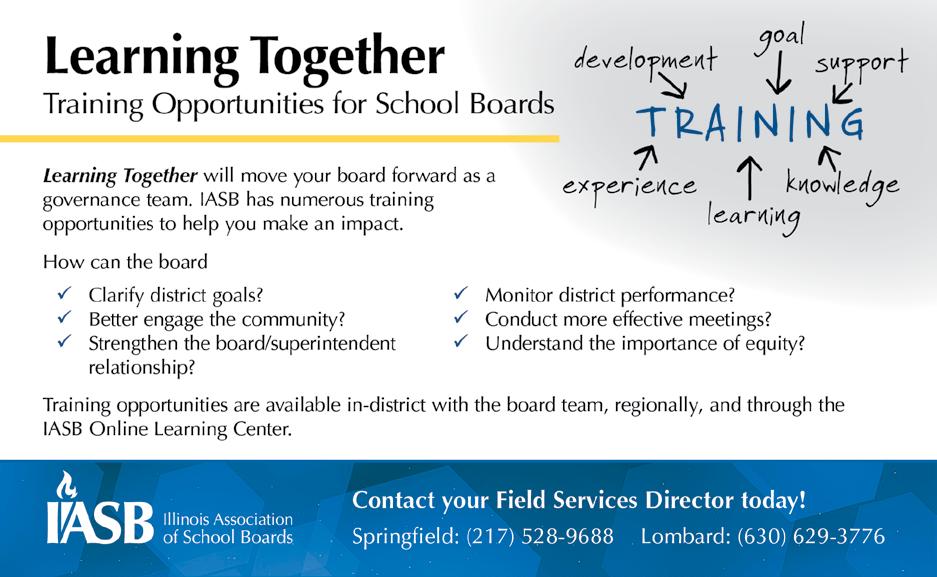
associations need to continue to provide opportunities for local board members to connect with colleagues from across the country. Also, we’re preparing leadership development opportunities for the leaderships of our state school board associations and the executive directors across the country. Those will be a focus, as will be not forgetting who we work for – the state school board associations – and serving them well.
What final advice do you have to offer school board members?
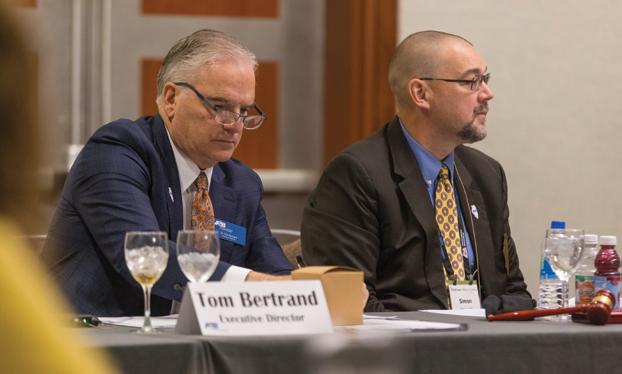
Tom: We need you now more than ever. We need stable, reasonable, committed leadership for our schools. We know we’ve emerged from what could have been the toughest two-to-three-year period to ever serve on a school board. But the work is not done, and the work of the school board is to set the strategic destination of the school district that the board serves.
I encourage boards to stay focused on student outcomes. There’s a lot of noise out there. There are a lot of adult issues that you might be dealing with, but never forget it’s about student outcomes.
Also be mindful of the fact that there is still that large silent majority out in your community. You often hear from the vocal minority, but there’s this large silent majority that frankly is exhausted and frustrated. The government might not be working for them at the federal level or at the state level, but they’ve always found comfort in knowing that local school governance has worked and continues to work. Be mindful of that, that they’re supportive of the board. You might hear from the naysayers at a board meeting, but I know when I was a superintendent, I used to remind the board of how many registered voters they actually represented, because sometimes a very vocal minority shows up at a school board meeting, but they don’t represent the number of registered voters, who might be 100 times or a thousand times the number of people that showed up at your meeting. That’s important to be mindful of. Trust but verify at a school board level. I think the most important question for boards to ask is how do we know? And to fill in the blank from a board perspective, asking
“How do we know that this program is serving children and their families?” It starts with asking that question. Trust but verify. That’s your responsibility because ultimately local school board governance works, but it only works through caring, committed people who are willing to serve on the school board.
I’m just grateful for their service and my time with this Association, I will leave with gratitude for the so many hundreds, thousands of school board members that I’ve met who truly want what’s best for the children and their families in their community, and who truly believe in the importance of public education and the importance of service. Fewer people are willing to serve today in all organizations. And so it’s just critically important that we have that type of committed leadership for our schools.
I’m so grateful for the opportunity to have served the association. It’s been a great opportunity. We’ve had a great staff here at IASB that will continue to serve the members, and I look forward to continuing my near-40 years of service in public education in and around it. I’m committed to it and look forward to the work ahead and wish all of our school board members in Illinois, and our staff here at IASB, the very best in the work ahead.
Theresa Kelly Gegen is a Director of Communications/Editorial Services for IASB and Editor of the Illinois School Board Journal. Isaac Warren is Assistant Director of Digital Communications for IASB. A recorded version of this conversation is available via the resources link at www.iasb.com/Journal.
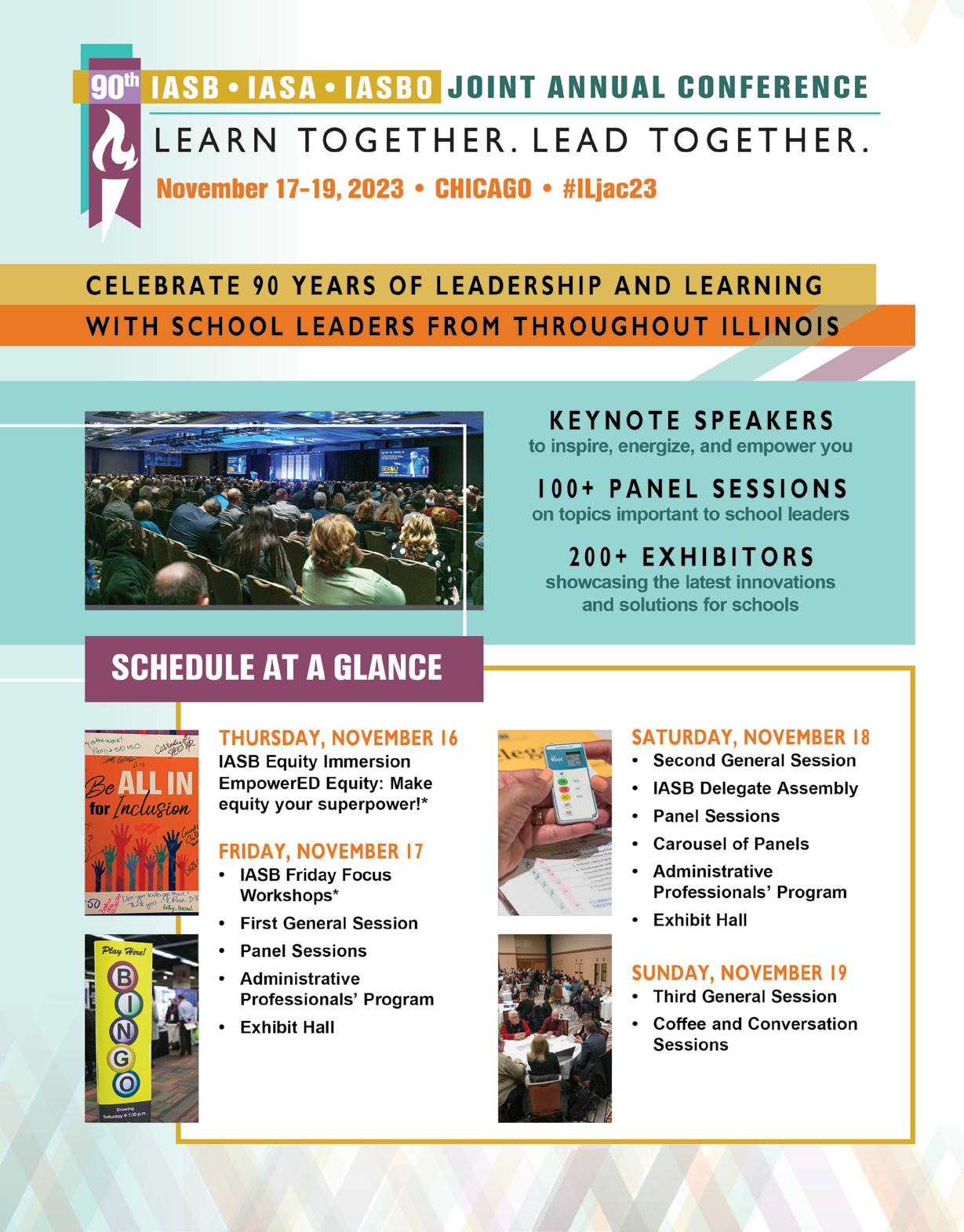
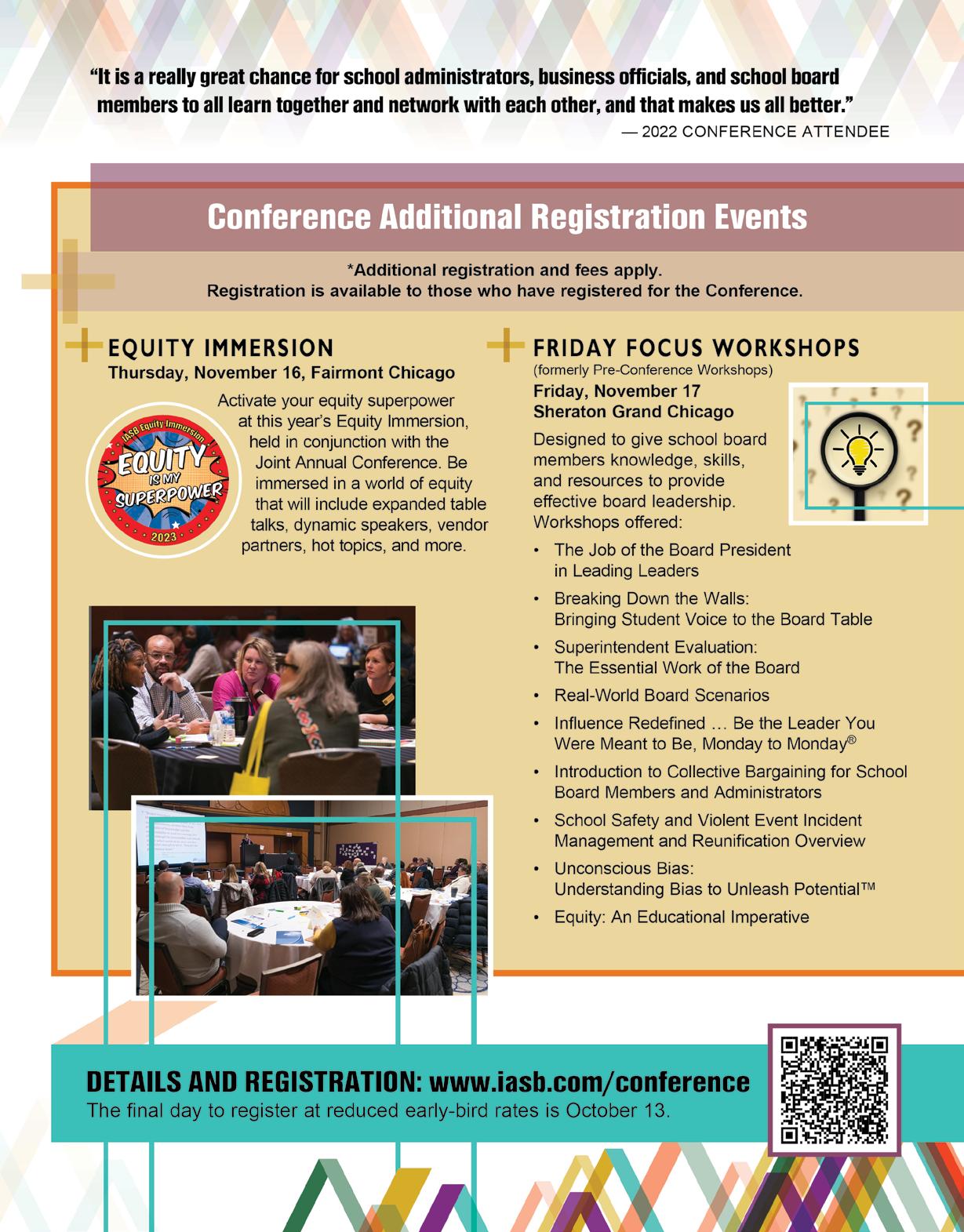
standing heads should be Title Case and left justified. Text black, thin line
The Role of School Boards and Superintendents in Crisis Management
By John McDonaldWWhen it comes to keeping our kids safe, we all have a role to play. For school board members and superintendents, there has never been a time when so much is at stake. Yet, for all the school safety training happening around the country that focuses on the important discussions of prevention, preparedness, response, and recovery, there is a lack of crisis management training and lessons learned shared with leaders, those with the ultimate responsibility.
Many school board members have limited knowledge about the state of school safety, the seriousness of threats impacting schools, and the consequence of changing discipline
strategies at odds with the emerging promising practice of threat assessment. The social-emotional concerns in schools today impact educational time, climate, culture, and school safety.
School board members and superintendents must be well-versed in school safety because, at the end of the day, it is our leaders who are held accountable.
It is also important that school boards learn about the safety issues impacting their districts annually both in public and executive session board meetings. The school safety discussion is an important opportunity to tell your district’s story about what you are doing to protect and
support students and staff, while the executive session is an opportunity to have a direct, open, and honest discussion of confidential security arrangements and the specific and emerging threats facing schools. Both conversations are necessary for good governance and policy. Failure to understand the changing landscape of school safety limits a district’s ability to effectively operate in the world of prevention. For a system built on organizational structure and consistency, where everything and everyone has a place and purpose, the lasting impacts of loss of life and lost trust, litigation, and legislation reverberate for years.

5 School Crisis Management Traps to Avoid
On the surface, crisis management may seem as if it is a one-sizefits-all decision matrix, but in a K-12 system, every issue is magnified, every decision is scrutinized, and every emotion is on full display when our most innocent are impacted, often for life. The crisis traps are many, and failure to effectively manage the crisis can lead to “panic management.”
1. Not Having a Strong Crisis Communications Plan
A community’s perception of how a district manages a crisis is often defined by what we say and, more importantly, by what we don’t say. Somewhere along the way, school leaders have become so concerned
about litigation that they often fail to address the media and even the school community, leaving lingering questions that lead to greater frustration and lost trust. Trust is hard to earn and harder to keep, and lost trust limits the effectiveness of a school board and superintendent. A strong crisis communications plan is critical to any chance of success, and great leaders are visible to their students, staff, families, and community. Understand early who the best spokesperson on behalf of the district is going to be. During the initial press conference, a principal should never face the media alone without the superintendent. While it is the principal who should be the voice of the school, the superintendent must be the voice for the district.
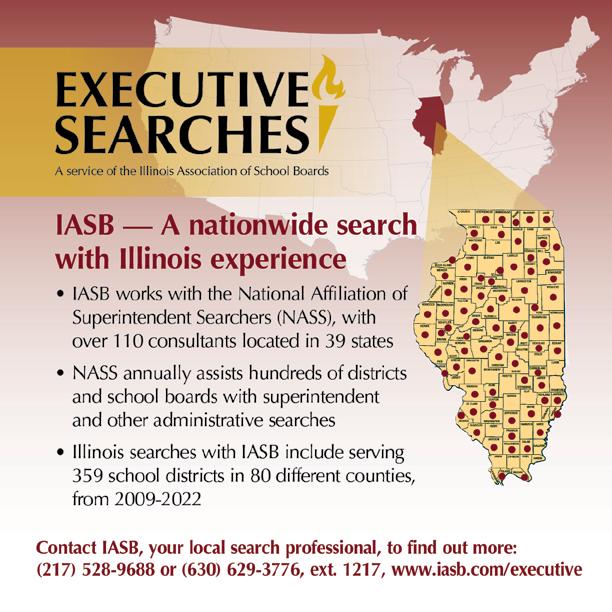
The school board president, at a minimum, should stand with the superintendent. If the school board decides to add its voice, then the school board president speaks to the media on behalf of the board.
2. Leading by Headlines
Too often districts lead by headlines following tragedy and fail to manage the crisis at hand. Manage what you see and what you know at the time. Understand that the changing narrative can often be managed by a point person who can correct misleading or wrong fact sets quickly without detracting from the crisis management work.
A good crisis team doesn’t allow soundbites to detract from the work, and a good spokesperson can correct the record during regular communication updates to parents, staff, and students. Remember, there is no such thing as internal communications. Internal messages will be sent to the media within moments of receipt, so whatever you say internally must be something you can also discuss externally.
3. Focusing on Politics Rather Than Student and Staff Recovery
Tragedy is not a political opportunity for school districts. There will be others that take up that space in the immediate aftermath, but our work as leaders is to find a way through recovery, focusing on our people so our students and staff can return to learn. Getting caught up in the political debate takes time away from your crisis management responsibilities. There will be time in the aftermath of a tragedy to determine how best to use the voice of the district, but it is not in the immediacy when
emotions are high. No matter the position we take, half of our families will be upset.
4. Not Vetting Business Partnerships
School safety is a multibillion-dollar-a-year growth industry, and everyone will want to sell you the next great product to save your life. There are trusted and vetted partners, and there are also those that would profit from tragedy with less-than-effective safety solutions. Know who you are working with and trust those you have longstanding relationships with. Ask other districts for recommendations and understand the problem before you seek a solution.
Are those who you’re doing business with trying to make a name for their company, using your tragedy to market their product? If the answer is yes, run! Focus on mission-aligned partnerships with businesses who are not offering something free for the school impacted by tragedy but who are interested in making sure all schools in the district have the same opportunity for safety.
Strong collaborative partnerships with businesses who will be there for you in the long term are essential, value-adding services.
5. Saying ‘Yes’ When You Should Say ‘No’
It is OK to say no! Give yourself grace and don’t feel like you need to say yes to everyone and everything. Organizations, businesses, nonprofits, and others will offer you support you didn’t know you needed. Most offers will be with good intentions, while others will do things in your school’s/ tragedy’s name that you won’t be comfortable being associated with.
The questions you should ask are: “What makes sense for our school? What will help our students and staff recover and be able to return to learn?”
A delicate but important conversation that every district crisis team will need to have is about the concept that a politician that isn’t adding value doesn’t need to be there. You will know quickly who is there for a soundbite and who is there to make a difference, and every tragedy has both. Be open to the possibility that the one who is providing the most support may be the least likely candidate to do so.
Success or Failure in Crisis Management Is Foundational
The board policies, the district practices, and the school procedures set the climate and culture for a prepared school response to any emergency. Board-driven, superintendent-led school safety is always the most effective model. When it becomes interlinked with a positive learning environment that includes kind, caring, and trusted staff, the school will be more prepared, empowering administration, educators, and students alike to own their own safety.
There is limited time to win back your school after tragedy. Success or failure will come down to leadership, people, communications, and intentionality. The decisions you make in the first 10 days following a tragedy can define your next five years. The greatest difficulty for leaders is keeping the focus on the main thing (the impacted school) while never taking your eye off the other main thing (the entire district).
Your decisions have real-life consequences, and you will model
the behavior for your cabinet/crisis team. Consider bringing in a crisis facilitator to help your leadership team navigate the perilous path to recovery. Small missteps can have serious implications, and you have a community counting on you.
Never Forget Those We Have Lost
District leaders are sometimes advised not to talk with families whose loved ones have died in our schools for fear of litigation. Sometimes, district leaders don’t talk with families because the anger and grief directed at us is overwhelming on a personal level. While there is nothing we can say or do to change the outcome after tragedy, we can engage and be present. Following tragedy, families who have suffered great loss often feel isolated from the school, compounding the grief. Find the balance and put the effort into supporting the victims.
In the midst of crisis management issues, the good news is that the lessons learned are out there, but for others to learn, we need to be willing to share our failures and successes.
Crisis management demands we check our egos at the door. In the end, what matters is that you do all that you can to live in the world of prevention because tragedy is just too damn hard.
John McDonald is the COO of the Council for School Safety Leadership, a Missouri School Board Association nonprofit initiative, providing crisis response solutions to school district leaders across the U.S. Resources associated with this article can be accessed via iasb.com/Journal. This article originally appeared in CampusSafetyMagazine.com.


standing heads should be Title Case and left justified. Text black, thin line
A Bill of Rights to Improve Teacher Evaluations
By Hans AndrewsAA Teacher’s Bill of Rights appears to be needed at this most important time and my experiences in education can help guide the key issues and outcomes. These experiences include secondary school teacher and counselor, teacher union leader, a community college instruction leader, adjunct university faculty member, a community college president, and a state, national, and international speaker on these topics.
The teacher shortage continues to affect school districts throughout Illinois. Even with actions underway to improve the situation, there is a long road ahead, and no question that teacher job satisfaction is a crucial factor.
The high-stakes testing and merit pay movements over the past decade have brought to the surface issues that should not have developed, including:

• Evaluating teachers by the scores their students receive on these state and national exams;
• Deciding on retention or dismissal of teachers based on these tests and not on their actual classroom teaching expertise;
• Rewarding teachers with a merit pay system that has failed everywhere it was implemented over the previous 50-plus years; and
• Merit pay being granted to teachers who may have been able to recruit top students to their classes for the purpose of improving the test scores for those teachers’ students.
Watching this develop has brought to mind many things that teachers should expect in their professional evaluations. These expectations have been pushed aside. With all of this in mind, the following expectations should become guidelines toward a Teacher’s Bill of Rights for teachers everywhere.
Let’s start with evaluations. Teachers should be able to have reasonable expectations of evaluators. Competent evaluators should be expected and used in all evaluations of teachers.
• Evaluators should have been excellent classroom teachers themselves.
• Evaluators must accept the wide range of teaching processes they observe.
• Evaluators and teachers should all understand the evaluation processes to be used.
• The evaluation instruments will have been reviewed and understood by teachers so they will know the expectations and can offer improvement suggestions.
• Consistency in evaluation should be expected by teachers and practiced by evaluators.
• Fairness needs to be expected and will allow for teachers to express disagreement where there are questionable evaluation comments or observations recorded.
• Disagreements should be expressed both orally and in writing.
• Feedback from the evaluator should be made in a reasonably short time to help relieve the anxiety of those evaluated.
• Feedback should be both verbal and written and allow for discourse from both the evaluator and the teacher.
• Positive recognition should be expressed both orally and in writing for excellent teachers.
It should assure that the tenured faculty member continues to maintain the appropriate level of competence as when they received tenure.
It is the responsibility of both the evaluator and teachers to follow up to see that unsatisfactory performances are remediated.
Incompetent faculty members should not be protected at the expense of the students.
Over the years, professional researchers have tended to classify
If there are areas suggested for remedial work to be done, there should be a defined timeframe so the teacher has an expectation of what to work on, an opportunity to receive assistance, and follow-up evaluations to chart progress.
A teacher bill of rights as outlined here should be looked at as guidelines in developing or improving a professional evaluation system. Such a well-designed system with input from both teachers and administrators can build trust and support between teachers and administrative evaluators and help make it a positive experience for both teachers and evaluators.
The process of evaluation after tenure or long-term hiring has been awarded was well stated by the National Commission of Higher Education Issues (1982):
teacher evaluation as either formative or summative. Formative teacher evaluation is conducted to improve the teacher by identifying the teacher’s strengths and weaknesses. Summative teacher evaluation is conducted primarily for the purpose of making personnel decisions about the teacher (e.g., special recognition, reassignment, promotion, dismissal, tenure) according to the Teacher Evaluation Glossary.
A 1990 study, which I co-authored with Christine M. Licata, took issue with whether evaluation must be divided as either formative or summative. We consider evaluation a continuum, providing formative support for teachers even during a process of remediation of teaching techniques that were identified as insufficient. There will be negative outcomes in almost any evaluation system, whether they are considered
The teacher shortage continues ... there is a long road ahead, and no question that teacher job satisfaction is a crucial factor.
formative or summative. Those who seem to have to have a dual system are not working in the same reality as those who are in the trenches of evaluation.
Most teachers respect evaluators who continue to work with them to improve their delivery of competent instruction to their students. When asked to state some ways that their teacher evaluation could be improved, here’s what teachers have said:
Utilize the results in a meaningful way to let faculty know when they are doing an excellent job and when they need help;

More feedback and awards from the system; and
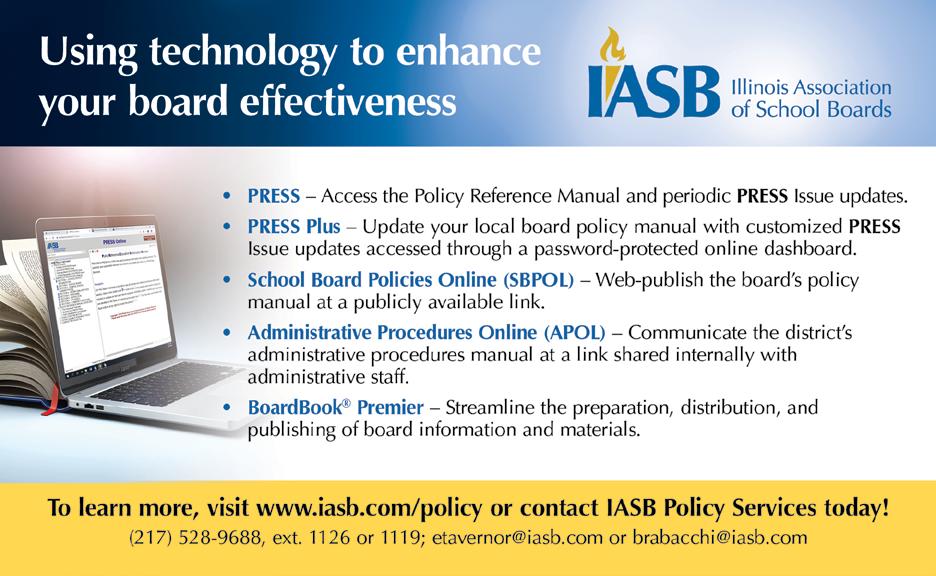
Reward the effective faculty members, not the “slouches.” There is not enough distinction now.
Conclusion
School districts have a big job ahead as they come out of and move forward from the two-plus
years of the coronavirus pandemic. Many teachers have become worn down and need a boost from governing boards and school administrators to help them bounce back. Working toward a Teacher’s Bill of Rights will help build positive expectations on how their teaching lives can be supported now and into the upcoming years.
Originally printed in Higher Education Digest. Hans Andrews, Ph.D., is the Distinguished Fellow in Community College Leadership for Olney Central College, Illinois. He helped start the first dual credit program between secondary schools and community colleges in the U.S. He is a former President of Olney Central College and a frequent contributor to the Journal on the topics of teacher shortage and dual credit programs.
Partnering with Your Community
By Keegan KocissTThe Tinley Park, Oak Forest, and Orland Park communities have always been steadfast partners of School District 146. In addition to supporting PTOs and PTAs with fundraising opportunities and donations, local businesses, organizations, and community leaders are active participants in student learning and family support.
Over the last two years, CCSD 146 has been making a concerted effort to highlight community partnerships, show businesses and organizations they are appreciated, and provide families with information on local supports. These goals are tied to the district’s strategic plan. The efforts have resulted in two new programs that rely on community partnerships.
The District 146 Community Partnership Program is aimed at providing businesses and organizations with opportunities to support our schools and impact student learning and development. The Community Resource Page provides the community with a list of resources that include, in part, local nonprofits, medical services, and child development programs. In both instances, local businesses and organizations share in the benefit.
Community Partnership Program
At the beginning of the 20222023 school year, we introduced the District 146 Community Partnership Program. The partnership program began with an effort to compile a database of businesses, organizations, and community leaders that have worked with the district in the past.
District schools regularly partner with businesses and community groups not just for fundraising opportunities, but for a variety of school activities. The district depends on partners to present at career days and “Explore More Days” and visit classrooms to discuss a variety of educational topics. Many groups and individuals, including libraries, scout troops, and even yoga businesses, attend after-school family events.
CCSD 146 also looked to expand its partnership list. We worked with local chambers of commerce to send a survey to their
members. The same survey was distributed to the public on District 146 social media accounts. The survey allowed those interested in partnering with the district to specify what they were seeking. Choices included fundraising assistance, volunteer opportunities for clubs, and classroom visits. By being visible in our schools and businesses, organizations can gather new customers and clients. In some instances, teachers, parents, and students find out about businesses and organizations from their presence in the schools. Many of these visits and events are captured in photos and shared on social media, showcasing these partnerships. As a token of appreciation, each partner receives a hand-written thank you card with a “District 146 Community Partner” window decal. We hope our partners display the sticker at their businesses or office to show the community that they are partnering with their local schools.
Community Resource Page
The district also created a Community Resource Page to link families, staff, and community members to local resources. The Community Resource Page was developed with

standing heads should be Title Case and left justified. Text black, thin line
the goal of combining multiple existing resource lists into one database. Previously, individual lists were maintained by the district’s early learning department, school psychologists, and school nurses.
A committee was created to help build this new database. The committee decided that simply listing resources was not adequate. We wanted to show families that the organizations and businesses are actual partners of District 146, not just a random list. Each resource listed has a cover page that includes a contact person, business hours, eligibility requirements, and additional documentation that may be needed to receive services.
Members of the committee, including early learning staff, social workers, and family support specialists, personally reach out to businesses to complete the informational cover pages. This not only assures accuracy but also creates a personal relationship between the district and its partners. By being included on the district’s Community Resource Page, these organizations and providers are not only gaining new clients, but also showing their care to those in need.
Creating the Community Resource Page eliminated redundancies in tasks and allowed the district to open the database to the public. Those seeking assistance can browse the list without speaking with school staff members, which may have been a deterrent to some seeking support.
Board Members as Advocates
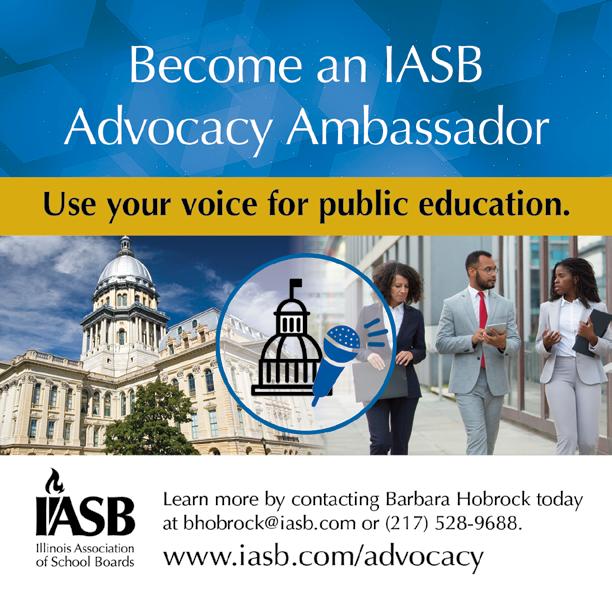
School PR professionals are always looking for a lead, and you can be that lead. As community
leaders, school board members are active in the community. Many are members of community organizations or local groups and have relationships with the type of organizations the schools could be looking for. Some are business owners themselves and know others who may be interested in being active in the schools. Those existing relationships can be utilized to benefit both the school district and the potential community partners. When planning to attend a community meeting or event, stop by and talk to the district staff member in charge of community relations. Ask what kind of information you can relay to business and organization leaders. Perhaps grab a few of their business cards
to distribute. Whether your district is looking for individuals to speak to classes, organizations to volunteer with, or fundraising opportunities, board members can be ready to tell the story of the district’s engagement efforts.
At District 146, as in many districts, community partnerships are always aimed at enhancing student learning and family support. That is our end goal. In whatever way you can help your district’s community outreach, keep the end goal in mind. Fostering community partnerships, if done well, will also foster student growth and development.
Proven for Schools and Universities


IPRF is the Leader in Workers' Compensation Coverage
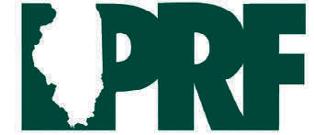
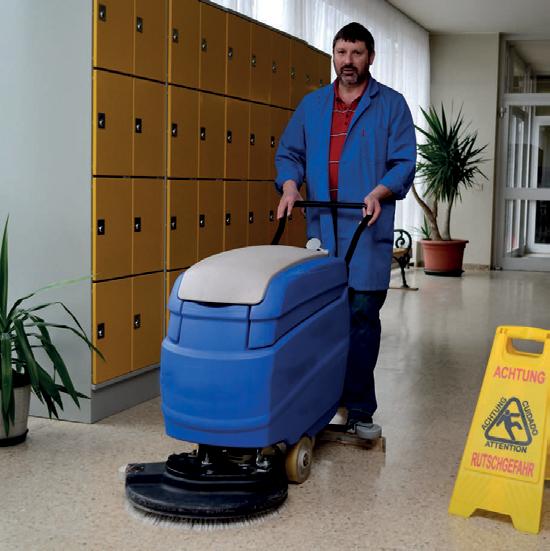
Since our inception in 1985, the Illinois Public Risk Fund has invited public entities and government agencies to e amine our outstanding record for cost-effective workers' compensation coverage Today, over 700 risk managers rely on IPRF for

24/7/365 Claim Reporting
In-house Nurse Case Management

Dedicated Claims Team
Aggressive subrogation program which will include members out of poc et expenses. Loss Control training and support that includes an extensive library of online training courses, simulator training and sample safety guides.
IPR members can select their own defense counsel sub ect to IPR ’s litigation management process and approval.
Service Associates Directory
Appraisal Services
INDUSTRIAL APPRAISAL COMPANY
Building and fixed asset appraisals for insurance and accounting purposes. Oak Brook (630) 575-0280
Architects/Engineers
ARCON ASSOCIATES, INC.
Full service firm specializing in educational facilities with services that include architecture, construction management, roof and masonry consulting, landscape architecture, and environmental consulting. Lombard (630) 495-1900; www.arconassoc.com; sjmattes@arconassoc.com
BERG ENGINEERING CONSULTANTS, LTD.
Consulting engineers. Schaumburg (847) 352-4500
BLDD ARCHITECTS, INC.
Architectural and engineering services for schools. Decatur (217) 429-5105; Champaign (217) 356-9606; Bloomington (309) 828-5025; Chicago (312) 829-1987 www.bldd.com
CORDOGAN CLARK & ASSOCIATES
Architects and engineers. Aurora (630) 896-4678; www.cordoganclark.com; Tpowers@cordoganclark.com
DEWBERRY ARCHITECTS INC.
Architects, planners, landscape architecture, and engineers. Peoria (309) 282-8000; Elgin (847) 695-5840 tcoker@dewberry.com
DLA ARCHITECTS, LTD.
Architects specializing in preK-12 educational design, including a full range of architectural services, assessments, planning, feasibility studies, new construction, additions, remodeling, O&M and owner’s rep services. Itasca (847) 742-4063; www.dla-ltd.com; info@dla-ltd.com
DLR GROUP
Educational facility design and master planning. Chicago (312) 382-9980; dlrgroup.com; mengelhardt@dlrgoup.com
ERIKSSON ENGINEERING ASSOCIATES, LTD.
Site Planning/Studies, Civil Engineering, Tra c/Transportation, Landscape Architecture. Grayslake (847) 223-4804; Chicago (312) 463-0551; Mokena (708) 614-9720
FARNSWORTH GROUP, INC.
Architectural and engineering professional services. Normal (309) 633-8436
FGM ARCHITECTS, INC.
Architects. Chicago (312) 942-8461; Oak Brook (630) 574-8300; O’Fallon (618) 624-3364; St. Louis (314) 439-1601; Milwaukee, Wisconsin (414) 346-7282 www.fgmarchitects.com
GREENASSOCIATES, INC.
Architecture/construction services. Deerfield (847) 317-0852; Itasca, (847) 317-0852 Springfield
HEALY BENDER PATTON & BEEN ARCHITECTS
Architects/Planners. Naperville (630) 904-4300; www.healybender.com; dpatton@healybender.com
HURST-ROSCHE, INC.
Architecture, engineering, planning, and interior design. Hillsboro (217) 532-3959; East St. Louis (618) 398-0890; Marion (618) 998-0075; Springfield (217) 679-1671; www.hurst-rosche.com
JMA ARCHITECTS
Full service professional design firm specializing in K-12 educational design, construction management, strategic/ master planning, health/life safety compliance, building commissioning, and interior space design. South Holland (708) 339-3900; www.jmaarchitects.com; allison@jmaarchitects.com
KLUBER ARCHITECTS + ENGINEERS
Building design professionals specializing in architecture, mechanical, electrical, plumbing, structural, and fire protection engineers. Batavia (630) 406-1213
IASB Service Associates are businesses which o er school-related products and services and which have earned favorable reputations for quality and integrity. Only after careful screening is a business firm invited to become a Service Associate.
To learn more about IASB Service Associates membership, visit www.iasb.com or contact IASB at bkusturin@iasb.com
LARSON & DARBY GROUP
Architecture, engineering, interior design, and technology. Rockford (815) 484-0739; www.larsondarby.com; snelson@larsondarby.com
LEGAT ARCHITECTS, INC.
Architectural and educational planners who specialize in creating e ective student learning environments. Gurnee (847) 622-3535; Oak Brook (630) 990-3535; Chicago (312) 258-9595; www.legat.com; jboyce@legat.com
PCM+DESIGN ARCHITECTS
Provide a full range of architectural services including facility and feasibility studies, architectural design, construction consulting, and related services. East Peoria (309) 694-5012; www.PCMPLUSD.com; whelmick@pcmplusd.com
PERFORMANCE SERVICES, INC.
An integrated design and delivery engineering company serving the design and construction facility needs of K-12 schools. Schaumburg (847) 466-7220
PERKINS AND WILL
Architecture, educational planning, programing, master planning, re-referendum services.
Chicago (312) 755-0770 mark.jolicoeur@perkinswill.com; aimee.eckmann@perkinswill.com; rick.young@perkinswill.com
RICHARD L. JOHNSON ASSOCIATES, INC.
Architecture, educational planning. Rockford (815) 398-1231; www.rljarch.com
STR PARTNERS
Architectural, interior design, planning, cost estimating, and building enclosure/ roofing consulting.
Chicago (312) 464-1444
STUDIOGC ARCHITECTURE + INTERIORS
StudioGC is passionate communityminded partner, committed to creating imaginative and well-designed facilities. StudioGC o ers innovative planning, programming, architectural, interior design, and cost estimates.
Chicago (312) 253-3400
TRIA ARCHITECTURE
An architectural planning and interior design firm that provides services primarily to school districts in the Chicagoland area with an emphasis on service to their clients, and their communities.
Burr Ridge (630) 455-4500; www.triaarchitecture.com
WIGHT & CO.
A fully integrated design, engineering, and construction firm that partners with education leaders to create progressive, inspiring, and sustainable learning environments, while helping to manage risk and provide accountability in the delivery of work. Darien (630) 969-7000
WOLD ARCHITECTS AND ENGINEERS
Specializing in Pre-K-12 educational design including master planning, sustainable design, architecture, mechanical and electrical engineering, quality review, cost estimation and management.
Palatine (847) 241-6100
Building Construction
BOLLER CONSTRUCTION CO., INC.
Construction Manager and General Contractor specializing in building and renovating schools.
Waukegan (847) 662-5566
CORE CONSTRUCTION SERVICES OF IL., INC.
Professional construction management, design-build, and general contracting services. Peoria (309) 404-4700; COREconstruction.com; mikaylavincent@coreconstruction.com
F. H. PASCHEN
A general/construction manager with extensive experience in new construction and renovation of educational and institutional facilities in the public/private sectors. Chicago (773) 444-1525; www.fhpaschen.com; aizzi@fhpaschen.com
FREDERICK QUINN CORPORATION
Construction management and general contracting. Addison (630) 628-8500
HOLLAND CONSTRUCTION SERVICES, INC.
Full service construction management and general contracting firm specializing in education facilities.
Swansea (618) 277-8870
IHC CONSTRUCTION COMPANIES LLC
IHC Construction Companies LLC is a full-service construction management firm that delivers new construction, additions, and renovations for School District clients on-time and within budget.
Elgin (847) 742-1516
INTERNATIONAL CONTRACTORS, INC. (ICI)
An award-winning construction management firm specializing in K-12 facilities. Our firm is currently partnering with eight Illinois School Districts on capital improvement projects. Oakbrook Terrace (630) 641-6852
NICHOLAS & ASSOCIATES, INC.
Construction management, general contracting, design and build. Mt. Prospect (847) 394-6200 info@nicholasquality.com; nickjr@nicholasquality.com
PEPPER CONSTRUCTION COMPANY
Construction management and general contracting services. Barrington (847) 381-2760; www.pepperconstruction; jripsky@pepperconstruction.com
POETTKER CONSTRUCTION COMPANY
Specializing in construction management, design/build, construction consulting services, and energy solutions for education clients.
Breese (618) 526-7213; www.poettkerconstruction.com
RUSSELL CONSTRUCTION COMPANY, INC.
Russell provides successful, knowledgeable construction management and contracting services in the PreK-12 market from concept to completion and continuing care for your facility needs.
Davenport, Iowa (563) 459-4600; www.russellco.com; sbaumann@russellco.com
SERVPRO TEAM WOLFE
Servpro Team Wolfe specializes in the cleanup and restoration of commercial properties after a fire, smoke or water damage. Assist schools in developing a recovery plan to put things back to preloss condition quickly and e ectively.
E ngham (314) 502-1337
S.M. WILSON & CO. Provides construction management and general construction services to education, healthcare, commercial, retail, and industrial clients.
St. Louis (314) 645-9595; www.smwilson.com; kristyn.newbern@smwilson.com; amanda.bohnert@smwilson.com
TRANE
HVAC company specializing in design, build, and retrofit.
Willowbrook (636) 305-3600
Computer Software, Supplies, Services
COMPUTER INFORMATION CONCEPTS, INC.
Infinite Campus student information System and Finance Suite, and Tableau Data Visualization/Analytics.
Greeley, Colorado (312) 995-3342
EDMENTUM
We provide fully digital curriculum and assessment tools for educators to utilize in K-12 classrooms to establish blended and personalized environments and advance student learning.
Bloomington, Minnesota (952) 832-1570
COMMON GOAL SYSTEMS, INC.
We o er cloud-based software solutions for student information management, student registration, state reporting, financial management and payroll, parent communication, scheduling, gradebooks, report cards, and more.
Elmhurst (630) 592-4200; www.common-goal.com
Consulting
EOSULLIVAN CONSULTING
Illinois-based EOSullivan Consulting has developed a proven process the helps school districts with community engagement, survey research, messaging, informational campaigns and referendums. Libertyville (815) 353-1991
Environmental Services
ALPHA CONTROLS & SERVICES, LLC
We deliver energy cost justified solutions that make the learning environment comfortable, secure, and e cient. Rockford, Springfield, Champaign (815) 227-4000; www.alpaacs.com; jasonv@alphaacs.com
VEREGY
Dedicated to assisting K-12 education meet the challenge of providing healthy, safe, and educational appropriate learning environments.
St. Louis (636) 230-0843; Chicago (773) 633-0691; veregy.com; bsmith@veregy.com
ENERGY SYSTEMS GROUP
A comprehensive energy services and performance contracting company providing energy, facility and financial solutions. Itasca (630) 773-7201; jcohn@esg.email
GRP MECHANICAL CO., INC.
Renovating buildings through energy savings performance contracting to provide the best learning environment. HVAC, plumbing, windows, doors, and mechanical services.
Bethalto (618) 779-0050
IDEAL ENVIRONMENTAL ENGINEERING, INC.
Asbestos and environmental services. Bloomington (309) 828-4259
ILLINOIS ENERGY CONSORTIUM
Sells electricity and natural gas to school districts, colleges, and universities. DeKalb (815) 753-9083; www.ILLec.org; hwallace@iasbo.org
ENGIE SERVICES U.S.
Turnkey partnership programs that enable K12 school districts in Illinois to modernize their facilities; increase safety, security and e ciency; reduce operations costs; and maximize the lifespan of critical assets. Chicago (312) 498-7792; sharon.uslan@engie.com
RADON DETECTION SPECIALISTS
Radon measurements in elementary, middle, and high schools, as well as all DCFS licensed spaces. We service the entire state of Illinois. Westmont (630) 325-4443 or (800) 244-4242
Financial Services
BERNARDI SECURITIES, INC. Municipal bond specialty firm; o ers a full range of school bond underwriting services, including capital needs financing and debt refinancing. O’Fallon (618) 206-4180; Peru (815) 587-8972; Chicago (312) 281-2014; jvezzetti@bernardisecurities.com
BMO HARRIS BANK
BMO Harris Bank’s experienced specialists can help you build a sound strategy to help close budget gaps, manage day-to-day cash flow and maximize your resources. Chicago (312) 461-7895
EHLERS AND ASSOCIATES
School bond issues; referendum help; financial and enrollment studies. Roseville, Minnesota (312) 638-5250; www.ehlers-inc.com; tolszewski@ehlers-inc.com
GORENZ AND ASSOCIATES, LTD.
Auditing and financial consulting. Peoria (309) 685-7621
ICE MILLER, LLP
Nationally recognized bond counsel services. Chicago (312) 726-7127
KINGS FINANCIAL CONSULTING, INC.
Municipal bond financial advisory service including all types of school bonds; school referenda, county school sales tax; tax revenue forecasts/projections.
Monticello (217) 762-4578
SPEER FINANCIAL, INC.
Financial planning and bond issue services. Chicago (312) 346-3700; www.speerfinancial.com; dphillips@speerfinancial.com; rmckenzie@speerfinancial.com
STIFEL
Full service securities firm providing investment banking and advisory services including strategic financial planning; bond underwriting; referendum and legislative assistance.
Edwardsville (800) 230-5151; noblea@stifel.com
WINTRUST FINANCIAL
Financial services holding company engaging in community banking, wealth management, commercial insurance premium financing, and mortgage origination. Rosemont (630) 560-2120
Human Resource Consulting
BUSHUE HUMAN RESOURCES, INC. Human resource, safety and risk management, and insurance consulting. E ngham (217) 342-3042; www.bushuehr.com; steve@bushuehr.com
Insurance
THE SANDNER GROUP Insurance program management, marketing & claims services for workers’ compensation, property & liability. Chicago (800) 654-9504
O ce Equipment
EDUCATIONAL ENVIRONMENTS BY FRANK COONEY COMPANY, INC. Furniture for educational environments. Wood Dale (630) 694-8800; www.frankcooney.com; gregory@frankcooney.com
Superintendent Searches
ECRA GROUP
Superintendent searches, board and superintendent workshops. Schaumburg (847) 318-0072
In Memoriam
Brian A. Braun, 76, has died. He was a school attorney In Illinois for almost 50 years.

Braun was a staff attorney for the Illinois Association of School Boards from 1977 to 1983. During the onset of collective bargaining mandates in Illinois, Braun worked directly with school boards through the Association’s School Management Foundation of Illinois, which at the time offered consultation services in collective bargaining, management development, and policy writing.
Thereafter, Braun was with the law firm of Miller, Tracy, Braun, Funk & Miller, Ltd. Braun served the National Council of School Attorneys as a director and chaired the Illinois Council of School Attorneys. He was a lecturer on school law and labor relations for Illinois colleges and universities. Prior to his law career, Braun was a Language Arts teacher in DuPage County.
“Brian was among the first attorneys in the nation to practice public K-12 school law,” said IASB Executive Director Kimberly Small, who worked with Braun in her role as the Association’s General Counsel. “His entire
Milestones
Continued from page 34
Jarvis Lowell Spreng, 96, died May 29, 2023. He had served on the school board for Naperville CUSD 203.
Robert Stavrakas, 94, died April 25, 2023. He was an educator and past member of the Arlington Heights SD 25 school board.
Clarence Robert Toftoy, 97, died March 30, 2023. He had served on the board for Millbrook Grade School Board in Kendall County.
career has been about humble service to impact public school students and mentoring attorneys into practicing school law.”
Braun was the co-creator and author of the Illinois School Law Survey, published by IASB and now in its 17th edition. The Illinois School Law Survey is a reference for answers to education-related questions based on current law and practice. He was also a contributor to Collective Bargaining and the Illinois School Board Member by the late Ronald R. Booth and the Illinois School Board Journal In November 1996, Braun received the Harold P. Seamon Award from IASB for distinguished service to public education.
“I had the pleasure of working with Brian as an author for IASB publications,” said Kara Kienzler, IASB Associate Executive Director for Communications and Production Services. “He could share the history of every entry in the Law Survey. In addition to his vast knowledge of school law, he was a gifted writer who always insisted on sharing credit with IASB staff and co-authors.”
Born in Chicago and raised in Glencoe, Braun attended Glencoe Public Schools and New Trier High School. He was a graduate of the University of Illinois College of Communications and the DePaul University College of Law.
“His knowledge, service, and mentorship will be greatly missed and his influence on education here in Illinois will be long-respected,” said Small.
Braun is survived by his wife, Terre, and three children: David, who practices law at Miller, Tracy, Braun, Funk & Miller, Ltd.; Aaron, who is the rabbi at Northbrook Community Synagogue; and Max, who is a digital analyst with RAPP in Dallas, Texas. There are seven grandchildren, Samantha, Ari, and Tal, children of David and Sadie Braun; and Aidan, Lily, Jonah, and Jack, children of Aaron and Marina Braun.
A service was held on June 5 at Shalom Memorial Funeral Home in Arlington Heights.
Dale Williamson, 87, died April 8, 2023. He was a past member of the school boards for Newark CCSD 66 and Newark CHSD 18.
Samuel Albert Williamson, 89, died April 11, 2023. He had served on the Iroquois County CUSD 9 school board.
Joseph R. Wolf, 88, died April 26, 2023. He was a past member of the Kaneland CUSD 302 school board.
John Richard “Dick” Worthington, 92, died April 24, 2023. He was a past member and president of the Freeport SD 45 school board.
John Allen Young, 94, died May 5, 2023. He had served on the Westville CUSD 2 Board of Education.
Please send obituary information to communications@iasb.com for inclusion in the Milestones section.
Milestones
In Memoriam
H. James Baum, 85, died April 6, 2023. He had served as a member of the school board for Morris CHSD 101.
Rosemary Beatty, 92, died April 3, 2023. She was a member of the Leepertown Grade School Board of Education in Bureau County.
Duane Bell, 90, died May 6, 2023. He had served on the North Greene USD 3 Board of Education.
Heidi Keye Biederman, 83, died April 20, 2023. She was a past member of the school board for Glen Ellyn SD 41, a staff member at IASB, and was the first Executive Director of the Large Unit District Association (LUDA).
Ernie Bingman, 80, died April 18, 2023. He had served on the Carmi-White Co CUSD 5 school board.
Duane Russell Bradley, 80, has died. He was a past member of the board of education for Downers Grove GSD 58.
Dean E. Ten Bruin, 75, died April 16, 2023. He has served on the school board for the Spring Grove School in McHenry County.
Wendell “Breezy” Cofoid, 86, died May 2, 2023. He was a past member of the Deer Park CCSD 82 Board of Education.
Dan DeCaprio, 71, died May 9, 2023. At the time of his passing he was the vice president of the school board for Manhattan SD 114. His career included teaching, coaching, college admissions, and athletic administration.
Earl R. Espenschied, 94, died May 28, 2023. He had served on the school board for Freeburg CCSD 70.
Edward R. Evans, 91, died April 6, 2023. He was a past member of the Hinckley-Big Rock CUSD 429 Board of Education.
Fred R. Finchum, 78, died April 27, 2023. He was a 12-year member of the Olympia CUSD 16 school board who also served as the mayor of Atlanta.
Felix Velton Floyd Jr., 75, died May 10, 2023. He had served on the school board for Roxana CUSD 1.
Peter Jeffrey “Pete” Frantz, 80, died May 9, 2023. He was a past member of the school board for Lincoln Elementary SD 27.
Dennis P. Fulrath, 76, died April 2, 2023. He was a past member of the Rock Falls THSD 301 school board.
Robert Gene Gerhardt, 82, died March 26, 2023. He served the Warsaw CUSD 316 as both a school board member and a bus driver.
Ronald J. Gohl, 85, died April 26, 2023. He was a past member of the Harrison SD 36 Board of Education.
Edward Golden, 96, died May 22, 2023. He had served on the Petersburg school board in Menard County.
Gail Gonigam, 88, died April 18, 2023. He served on the Walnut Board of Education in Bureau County.
Jack G. Hanlon, 63, died April 24, 2023. He was a past president and 25-year member of the South Fork SD 14 school board.
Noah D. Herrmann, 95, died April 23, 2023. He had served on the school board for Williamsfield CUSD 210.
Dale E. Ingram, 85, died May 15, 2023. He was a longtime member of the Athens CUSD 213 Board of Education.
Frances Lea Johnson, 92, died March 28, 2023. She was a past member and president of the school board for Crystal Lake CCSD 47.
Ralph Evan Johnson, 90, died April 6, 2023. He was a past member of the Franklin CUSD 1 school board.
Bruce M. Jones, 71, died May 23, 2023. He was a long-time member and past president of the Centralia SD 135 school board.
Rose Anne Kersten , 93, died April 14, 2023. She was a past member of the school board for Rochelle CCSD 231.
Fred L. Kramer, 83, died April 11, 2023. He was a past member of the school board for Tri-City CUSD 1.
Robert Lemon, 75, died April 28, 2023. He served on the school boards for West Chicago SD 33 and Community High School District 94.
John L. Mclaughlin , 87, died April 29, 2023. He was a past member of the Griggsville-Perry CUSD 4 Board of Education.
Anthony Z. Mielcarz , 84, has died. He was a past member of the Park Forest Chicago Heights SD 163 school board.
Darrell Raymond Oberle , 95, died April 18, 2023. He served on the boards for Ohio CCSD 17 and Kasbeer schools in Bureau County.
Barbara E. O’Connor, 89, died April 19, 2023. She was a past member of the Bushnell-Prairie City CUSD 170 school board.
Gerald Keith Peel, 86, died April 26, 2023. He had served on the school board for East Alton SD 13.
Judith Picus, 93, died April 16, 2023. She served two terms on the Rockford SD 205 school board including two years as president.
Dan Reifsteck, 84, died May 13, 2023. He was a past member of the Thomasboro CCSD 130 Board of Education.
Continued on page 33
standing heads should be Title Case and left justified. Text black, thin line
“ISBE is looking for new providers to offer preschool programs in areas of the state designated as ‘preschool deserts,’ with the goal of creating 5,000 new preschool slots in the upcoming school year. The $75 million in new funding available … is part of [Governor] Pritzker’s $250 million “Smart Start Illinois” initiative, a fouryear effort that seeks to make early childhood daycare and preschool available and affordable to every family in the state who needs it… ISBE defines a preschool desert as an area where there is an insufficient number of publicly funded slots to serve at least 80% of 3- and 4-year-old children from low-income families. ‘You find [preschool deserts] everywhere, from Belvidere to Springfield to Shawnee, all the way down in southern Illinois,” [State Superintendent
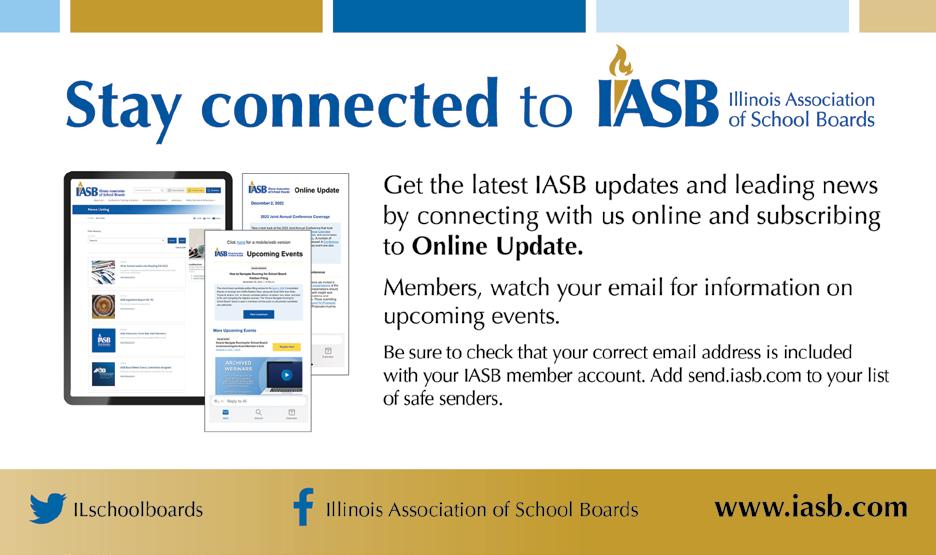
Tony] Sanders said. The grants will fund the creation of new programs as well as the expansion of existing programs with priority being given to applicants who serve children in preschool deserts outside the city of Chicago, which has a separate appropriation for early childhood programs.”’
“Illinois Board of Education looking for new providers in preschool ‘deserts,’” by Peter Hancock, Capitol News Illinois, June 1, 2023
“U.S. teachers are divided on whether arming themselves would make schools safer, with one in five saying they would be interested in carrying a gun to school, according to a nationally representative survey conducted by the RAND Corporation. The survey found that 54% of teachers believe teachers carrying firearms would make
schools less safe, 20% believe teacher-carry would make schools safer, and 26% feel it would make schools neither more nor less safe. … even more concerning to teachers than guns is bullying, which teachers listed as their top safety concern. Based on the survey results, the researchers suggest several areas for further research… [e.g.] developing better approaches for school safety and security planning that might balance the frequent, lower-level forms of school violence such as bullying with lower-probability, extreme forms of school violence like shootings.”
“1 in 5 Teachers Feel Carrying Gun to Class Would Make Schools Safer; More Than Half Think Armed Teachers Would Make Students Less Safe,” based on research by Brian A. Jackson, Melissa Kay Diliberti, Pauline Moore, Heather L. Schwartz, RAND Corporation, May 31, 2023
2921 Baker Drive
Springfield, Illinois 62703-5929
Address Service Requested
